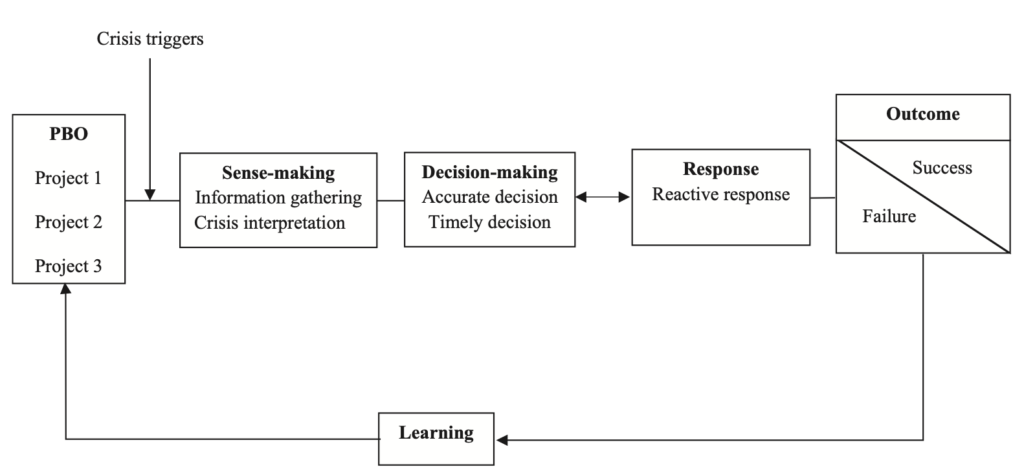
OVERVIEW | Crisis management in project-based organizations?
Project-based organisations (PBOs) are temporary organisations formed to carry out specific and often complex projects. Whether it’s technology development, a major construction project, or a complex research project, crises – unexpected and high-impact events – can undermine their success. But what are the most effective ways to deal with crises?
Elements of Crisis Management in PBOs
Iftikhar et al. (2023) divide the crisis management process into five major components: understanding the situation, decision making, responding, evaluating outcomes, and learning. We explain what each element means and how they are related in the context of PBOs.
In times of crisis, decisions must be made quickly and accurately, as delays or incorrect choices can exacerbate the situation. The authors point out that, unlike permanent organisations, PBOs must consider time constraints and uncertainty in decision-making (ibid., pp. 108-110). Managers must be able to assess and use available information quickly but effectively in order to make quality decisions. To successfully deal with crises in PBOs, project managers should practise decision-making skills and develop the ability to make quick but accurate decisions.
One of the most important stages of crisis management is reaction, which involves putting decisions into action. Although PBOs could theoretically employ both proactive and reactive strategies, the unpredictable nature of crises frequently necessitates a reactive approach (Iftikhar et al., 2023, p. 111). Reactive response implies that organisations must be prepared to act without long-term plans and adapt to rapidly changing situations.
Crisis management can lead to either success or failure. It is critical to understand that the outcome is determined by the quality of crisis management, including how decisions were made, how quickly responses were delivered, and what resources were deployed. The authors emphasise that an effective outcome evaluation allows an organisation to assess its success and analyse its mistakes (ibid., p. 112).
The article clearly identifies learning as a critical component of crisis management, which will assist PBOs in improving future crisis management processes. According to Iftikhar et al. (2023, p. 113), every crisis provides valuable lessons that must be systematically captured and disseminated within the organisation in order to avoid repeating the same mistakes. Although crises are often negative experiences, learning from them can help organisations improve their processes and better prepare for future crises.
Strengths of the article
The article’s main strength is its comprehensive crisis management model (see Figure 1), which covers all of the essential elements and assists project-based organisations (PBOs) in responding effectively to crises and learning from the experience (ibid., p.106). This framework provides a clear and structured approach to enhancing PBOs’ ability to deal with unexpected and high-impact events. Furthermore, the authors emphasise that post-crisis learning is an essential component of crisis management and that organisations that capture and apply lessons learnt will achieve better results in the future (ibid., p. 113). This knowledge gives PBOs a significant advantage in learning from previous mistakes and improving their crisis management processes.
The article connects crisis management and dynamic capability theory, demonstrating how PBOs can reshape and improve their capabilities in response to changing environments (ibid., pp. 104-105). This theoretical approach provides a more in-depth understanding of how organisations can continuously adapt and remain competitive. The article will also be useful for project managers because it provides explanations and practical advice on how to prepare for crises, such as quick decision-making and effective information gathering (ibid., p.109). It will assist project managers in developing the skills and strategies necessary to deal with crises.
One of the article’s strengths is its unique approach, which focusses specifically on PBOs. This is significant because the literature to date has largely focused on traditional permanent organisations while ignoring the unique needs of PBOs (ibid., pp. 101-103). As a result, the approach presented in this article represents a significant step forward for PBOs, providing a valuable knowledge base and practical guide to assist them in better understanding and managing crisis situations.

Figure 1. Crisis management process model for project-based organizations (Iftikhar et al., 2023, p. 106).
Shortcomings of the article
The crisis management model presented in the article is conceptual and requires empirical testing to confirm its practicality (Iftikhar et al., 2023, p. 115). Although the authors provide a comprehensive framework, its successful application in various contexts has yet to be demonstrated, indicating that empirical studies are required to confirm the model’s effectiveness in practice. Furthermore, the article does not provide adequate discussion of how crisis management strategies should be tailored to different industries and project types. This limits the model’s overall applicability, as different industries have distinct needs and challenges that may necessitate specific approaches (ibid., p. 114).
One of the article’s flaws is the limited use of theories. While dynamic capability theory is widely used, incorporating socio-ecological and organisational behaviour theories could provide a more comprehensive understanding of how PBOs deal with crises (ibid., p. 104). Furthermore, the article does not go into detail about how to manage different types of crises, such as the difference between technical and social crises. The lack of this detail limits the model’s applicability in situations where the type of crisis influences the selection of appropriate strategies (ibid., p.103).
Another shortcoming is the absence of systematic methods for implementing learning. While the article emphasises the importance of learning in crisis management, it does not provide specific guidance on how to effectively use and disseminate crisis lessons within an organisation. This is an important factor that will help organisations avoid similar crises in the future and increase their capacity (ibid., p. 113).
Summary
Overall, the Crisis Management Process for Project-Based Organisations article is an excellent overview of how PBOs can effectively manage and learn from crises. The holistic model, which includes situational understanding, decision making, response, outcome evaluation, and learning, provides practical and theoretical benefits to both project managers and researchers.
Crises are unavoidable, but managing and learning from them will help PBOs remain resilient and prepared for future challenges. The general reader, who may not be an expert in crisis management or work in a PBO, can benefit from this article by learning a number of practical principles and skills. Here are some important lessons that the reader may take away:
- Fast and efficient decision-making: crisis management principles such as quick and accurate decision-making are beneficial not only to project managers, but also to anyone dealing with day-to-day issues. When an unexpected situation arises, acting quickly and thoughtfully helps to limit the negative consequences.
- Learning through experience: the article’s emphasis on post-crisis learning is also relevant on a personal level. Every problem or challenge represents an opportunity to learn and avoid making the same mistakes in the future. This enhances the ability to adapt and create better solutions.
- Gathering and comprehending information: effective crisis management begins with understanding the situation and gathering information. The same principle can be applied in everyday life, where gathering enough information is critical in complex situations to make the best decision possible.
- Developing adaptability: the Dynamic Capability Theory doctrine, which states that organisations must continuously develop and adapt their capabilities, also applies to individuals. Adaptability is essential in life-altering situations, such as job changes or personal challenges.
- The article discusses the differences between reactive and proactive responses. The average reader may discover that it is not always possible to plan everything in advance, but the ability to react quickly and flexibly can be just as important as careful planning.
These principles will help readers improve their critical thinking and problem-solving skills, as well as their ability to adapt to unexpected changes in their work and personal lives. Read the article here.
Photo: a female worker writing on the board (Pexels, 2019).
Sources
¹ Iftikhar, R., Majeed, M. & Drouin, N. (2023). Crisis management process for project-based organizations. International Journal of Managing Projects in Business, 16(8), pp. 100-125. https://doi.org/10.1108/IJMPB-10-2020-0306
Jaga postitust:
